phrases and sentences
- 格式:doc
- 大小:43.50 KB
- 文档页数:4
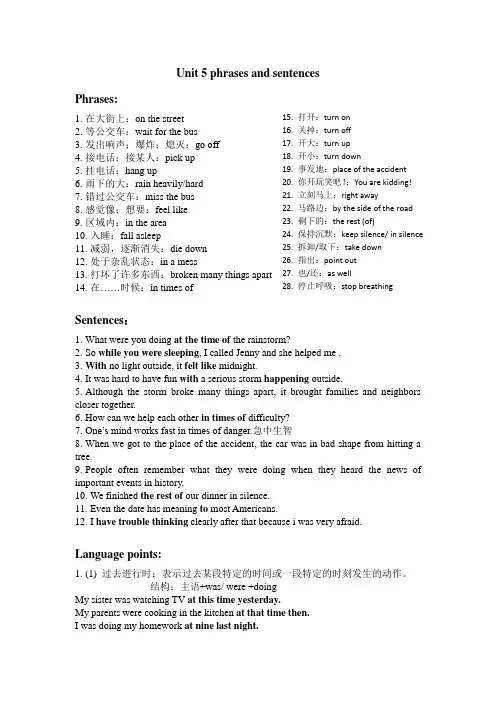
Unit 5 phrases and sentencesPhrases:2.等公交车:wait for the bus3.发出响声;爆炸;熄灭:go off4.接电话;接某人:pick up5.挂电话:hang up6.雨下的大:rain heavily/hard7.错过公交车:miss the bus8.感觉像;想要:feel like9.区域内:in the area10.入睡:fall asleep11.减弱,逐渐消失:die down12.处于杂乱状态:in a mess13.打坏了许多东西:14.在……时候:in times ofSentences:1.What were you doing at the time of the rainstorm?2.So while you were sleeping, I called Jenny and she helped me .3.With no light outside, it felt like midnight.4.It was hard to have fun with a serious storm happening outside.5.Although the storm broke many things apart, it brought families and neighborscloser together.6.How can we help each other in times of difficulty?7.One’s mind works fast in times of danger.急中生智8.When we got to the place of the accident, the car was in bad shape from hitting atree.9.People often remember what they were doing when they heard the news ofimportant events in history.10.We finished the rest of our dinner in silence.11.Even the date has meaning to most Americans.12.I have trouble thinking clearly after that because i was very afraid. Language points:1.(1) 过去进行时:表示过去某段特定的时间或一段特定的时刻发生的动作。
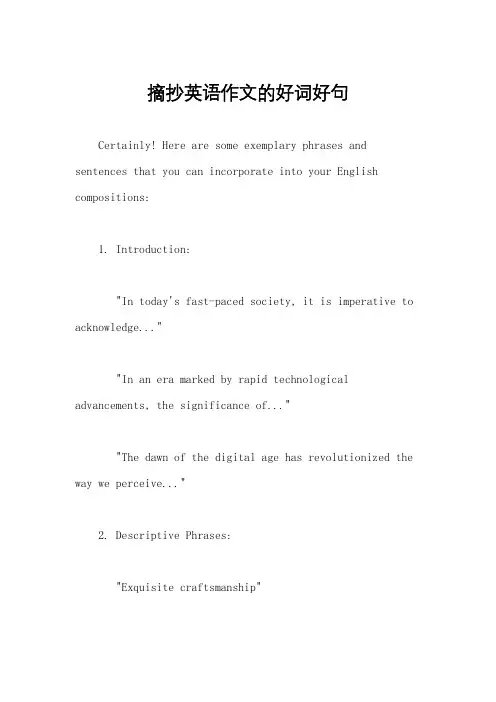
摘抄英语作文的好词好句Certainly! Here are some exemplary phrases and sentences that you can incorporate into your English compositions:1. Introduction:"In today's fast-paced society, it is imperative to acknowledge...""In an era marked by rapid technological advancements, the significance of...""The dawn of the digital age has revolutionized the way we perceive..."2. Descriptive Phrases:"Exquisite craftsmanship""A plethora of opportunities" "A cacophony of voices""A mosaic of cultures""A myriad of challenges""A confluence of ideas""A tapestry of experiences" "A kaleidoscope of colors""A symphony of emotions""A constellation of dreams" "An oasis of tranquility""A beacon of hope"3. Expressive Sentences:"With bated breath, we await the unfolding of events.""Amidst the chaos, there lies an inherent order waiting to be deciphered.""In the labyrinth of life, every twist and turn presents a new revelation.""Like a phoenix rising from the ashes, resilience emerges as humanity's greatest strength.""Beyond the horizon of uncertainty, lies the promise of infinite possibilities.""As the pendulum of time swings, it leaves an indelible mark on the canvas of history.""In the symphony of existence, each individual plays a unique melody, harmonizing with the collective whole.""In the tapestry of human relationships, every thread contributes to the intricate pattern of interconnectedness.""As the tides of change sweep across the landscape of tradition, evolution becomes the only constant.""Within the labyrinthine corridors of the mind, lies the key to unlocking the mysteries of the universe.""In the mosaic of humanity, diversity emerges as the cornerstone of progress and understanding.""As the stars shimmer in the velvety expanse of the night sky, they whisper secrets of distant galaxies yet to be explored.""In the crucible of adversity, character is forged, revealing the true essence of one's inner strength."4. Conclusion:"In summation, it is evident that...""To encapsulate, one must acknowledge...""In the grand tapestry of existence, each thread contributes to the rich fabric of human experience.""As we navigate the labyrinth of life, let us embrace the challenges and triumphs that lie ahead.""In the symphony of existence, let us each play our part with grace and fortitude."Feel free to blend these phrases and sentences seamlessly into your composition to enhance its eloquence and depth.。
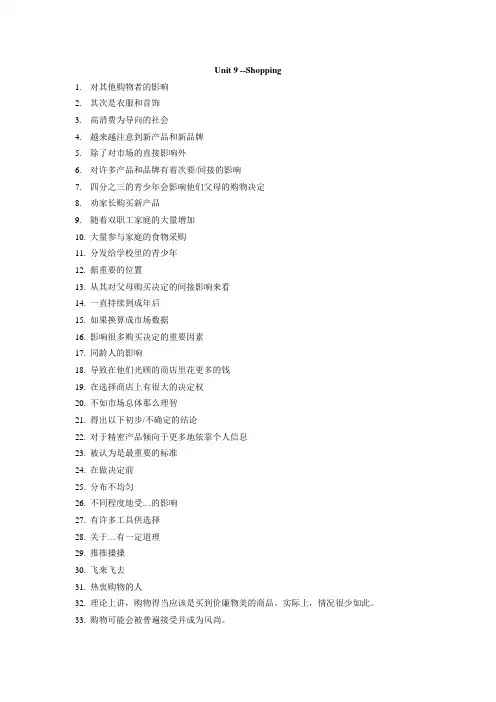
Unit 9 --Shopping
1.对其他购物者的影响
2.其次是衣服和首饰
3.高消费为导向的社会
4.越来越注意到新产品和新品牌
5.除了对市场的直接影响外
6.对许多产品和品牌有着次要/间接的影响
7.四分之三的青少年会影响他们父母的购物决定
8.劝家长购买新产品
9.随着双职工家庭的大量增加
10.大量参与家庭的食物采购
11.分发给学校里的青少年
12.据重要的位置
13.从其对父母购买决定的间接影响来看
14.一直持续到成年后
15.如果换算成市场数据
16.影响很多购买决定的重要因素
17.同龄人的影响
18.导致在他们光顾的商店里花更多的钱
19.在选择商店上有很大的决定权
20.不如市场总体那么理智
21.得出以下初步/不确定的结论
22.对于精密产品倾向于更多地依靠个人信息
23.被认为是最重要的标准
24.在做决定前
25.分布不均匀
26.不同程度地受…的影响
27.有许多工具供选择
28.关于…有一定道理
29.推推搡搡
30.飞来飞去
31.热衷购物的人
32.理论上讲,购物得当应该是买到价廉物美的商品。
实际上,情况很少如此。
33.购物可能会被普遍接受并成为风尚。
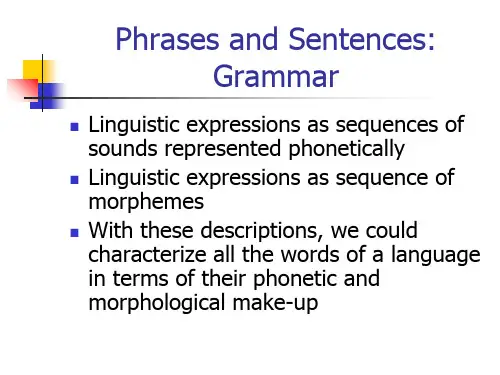
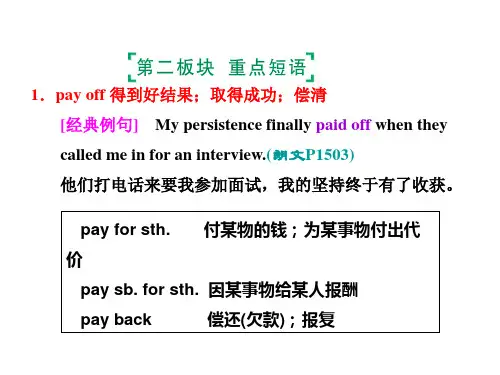
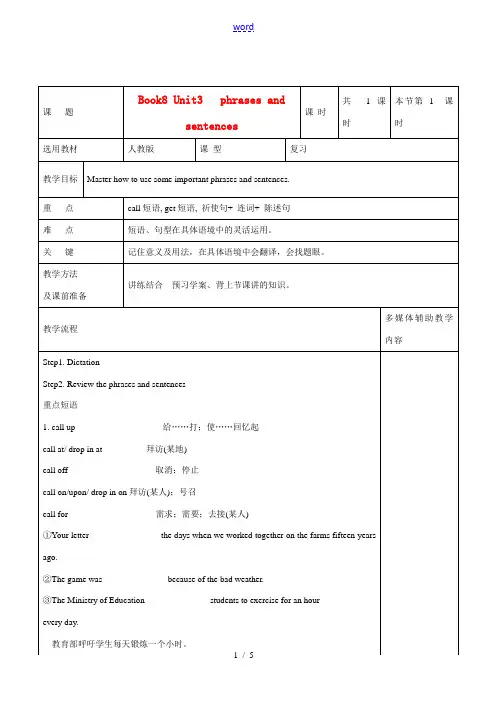
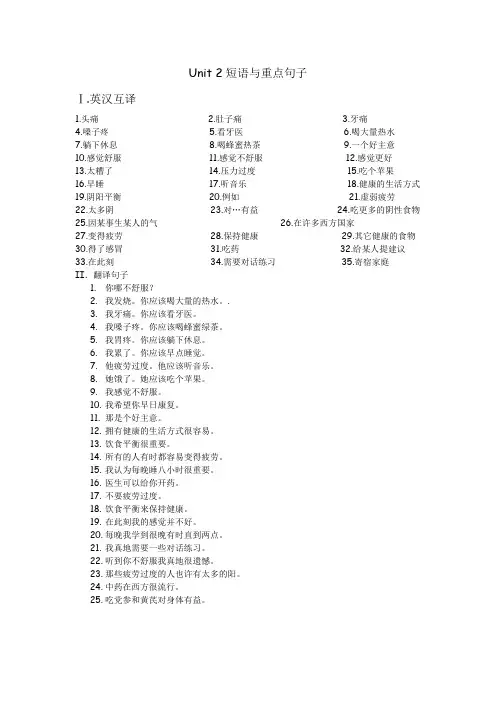
Unit 2短语与重点句子Ⅰ.英汉互译1.头痛2.肚子痛3.牙痛4.嗓子疼5.看牙医6.喝大量热水7.躺下休息8.喝蜂蜜热茶9.一个好主意10.感觉舒服11.感觉不舒服12.感觉更好13.太糟了14.压力过度15.吃个苹果16.早睡17.听音乐18.健康的生活方式19.阴阳平衡20.例如21.虚弱疲劳22.太多阴23.对…有益24.吃更多的阴性食物25.因某事生某人的气26.在许多西方国家27.变得疲劳28.保持健康29.其它健康的食物30.得了感冒31.吃药32.给某人提建议33.在此刻34.需要对话练习35.寄宿家庭II.翻译句子1.你哪不舒服?2.我发烧。
你应该喝大量的热水。
.3.我牙痛。
你应该看牙医。
4.我嗓子疼。
你应该喝蜂蜜绿茶。
5.我胃疼。
你应该躺下休息。
6.我累了。
你应该早点睡觉。
7.他疲劳过度。
他应该听音乐。
8.她饿了。
她应该吃个苹果。
9.我感觉不舒服。
10.我希望你早日康复。
11.那是个好主意。
12.拥有健康的生活方式很容易。
13.饮食平衡很重要。
14.所有的人有时都容易变得疲劳。
15.我认为每晚睡八小时很重要。
16.医生可以给你开药。
17.不要疲劳过度。
18.饮食平衡来保持健康。
19.在此刻我的感觉并不好。
20.每晚我学到很晚有时直到两点。
21.我真地需要一些对话练习。
22.听到你不舒服我真地很遗憾。
23.那些疲劳过度的人也许有太多的阳。
24.中药在西方很流行。
25.吃党参和黄芪对身体有益。
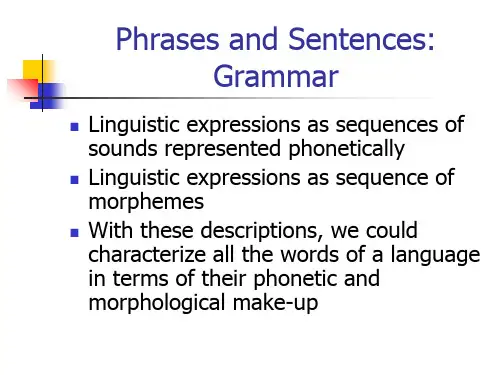
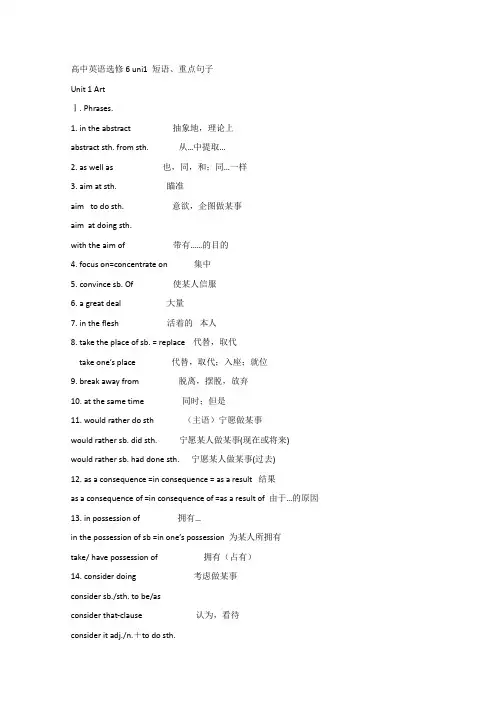
高中英语选修6 uni1 短语、重点句子Unit 1 ArtⅠ. Phrases.1. in the abstract 抽象地,理论上abstract sth. from sth. 从…中提取…2. as well as 也,同,和;同…一样3. aim at sth. 瞄准aim to do sth. 意欲,企图做某事aim at doing sth.with the aim of 带有……的目的4. focus on=concentrate on 集中5. convince sb. Of 使某人信服6. a great deal 大量7. in the flesh 活着的本人8. take the place of sb. = replace 代替,取代take one’s place代替,取代;入座;就位9. break away from 脱离,摆脱,放弃10. at the same time 同时;但是11. would rather do sth (主语)宁愿做某事would rather sb. did sth. 宁愿某人做某事(现在或将来) would rather sb. had done sth. 宁愿某人做某事(过去)12. as a consequence =in consequence = as a result 结果as a consequence of =in consequence of =as a result of 由于…的原因13. in possession of 拥有…in the possession of s b =in one’s possession为某人所拥有take/ have possession of 拥有(占有)14. consider doing 考虑做某事consider sb./sth. to be/asconsider that-clause 认为,看待consider it adj./n.+to do sth.15. be well worth doing 值得…(表被动)16. be contemporary with 与…属同时期17. convince sb. of sth 使某人确信/明白某事convince sb. +that clause 使某人相信…convince sb.to do sth. 说服某人做某事15. attempt to do sth. 企图做某事16. on one hand…… on the other hand……一方面…另一方面…17. scores of 许多,大量18. not only……but also 不但……而且19. every two years 每两年every second yearevery other year20. be (well) worth n./doing(主动表被动) …值得…Ⅱ.Sentences1. Art is influenced by the customs and faith of the people.艺术受人们生活方式和信仰的影响。
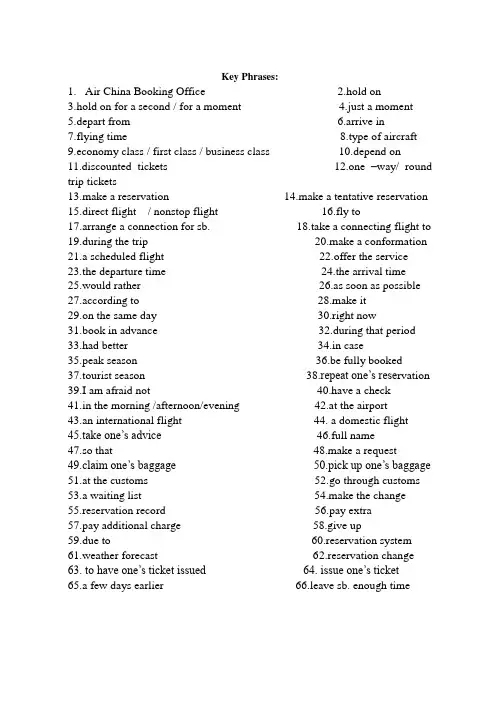
Key Phrases:1.Air China Booking Office2.hold on3.hold on for a second / for a moment4.just a moment5.depart from6.arrive in7.flying time 8.type of aircraft 9.economy class / first class / business class 10.depend on11.discounted tickets 12.one –way/ round trip tickets13.make a reservation 14.make a tentative reservation 15.direct flight / nonstop flight 16.fly to17.arrange a connection for sb. 18.take a connecting flight to 19.during the trip 20.make a conformation 21.a scheduled flight 22.offer the service 23.the departure time 24.the arrival time 25.would rather 26.as soon as possible 27.according to 28.make it29.on the same day 30.right now31.book in advance 32.during that period 33.had better 34.in case35.peak season 36.be fully booked37.tourist season 38.repeat one’s rese rvation 39.I am afraid not 40.have a check41.in the morning /afternoon/evening 42.at the airport43.an international flight 44. a domestic flight 45.take one’s advice 46.full name47.so that 48.make a request49.claim one’s baggage 50.pick up one’s baggage 51.at the customs 52.go through customs 53.a waiting list 54.make the change 55.reservation record 56.pay extra57.pay additional charge 58.give up59.due to 60.reservation system 61.weather forecast 62.reservation change 63. to have one’s ticket issued 64. issue one’s ticket65.a few days earlier 66.leave sb. enough timeKey Sentences:1、每天都有去广州的航班。
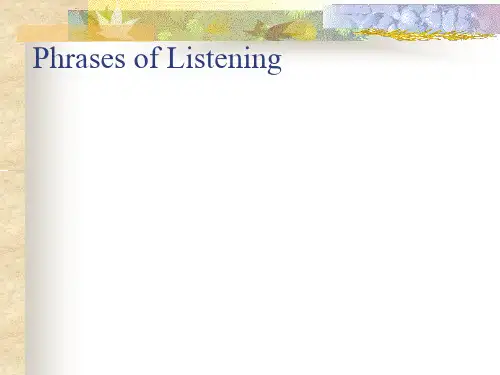
Unit 9 Time to CelebratePhrases:1.短暂拜访2.思考,考虑3.举行聚餐,野餐4.厌倦,厌烦5.请两个星期的假6.几个7.庆祝春节8.元宵节9.端午节10.中秋节11.中国的传统节日12.赏月13.观看烟火14.家庭聚会15.听起来像16.观看船赛17.赏灯笼18.走亲访友19.度假20.一个聚会邀请21.装饰房子22.在学期结束前23.在新年前夜24.在平安夜25.听起来有点儿令人厌烦26.感到震惊27.应当是个惊喜28.醒来发现29.因为30.说好给我的手表31.上面没有名字32.忙着拍大量的照片33.展现雪中美景34.许许多多的35.目前36.感恩节37.在十一月份的第四个星期四38.感谢大丰收39.来自美国的问候40.邀请我与她的家人一起庆祝节日41.耗尽42.偶然遇到43.白色圣诞节44.获得足够的睡眠45.上升46.我童年的记忆47.问题的主要原因48.太激动以致无法表达出她的幸福49.邀请你的朋友们庆祝即将到来的新年50.回复你的邀请51.敬请回复52.下降53.支付员工薪水54.捐款55.似乎;好像56.保证做…Sentences:1.Christmas Day is coming. How will you _________ it?(庆祝)2.___________ you __________ your success!(祝贺)3.We _____ _____ the past, _______ ______ ______ and hope for the success in the future.(从过去中学习,体验现在)4.You _____ _______ _______ to work in that company. Will you _____ ______ ______?(已经被邀请;接受邀请)5.You are a new comer. Why not_________ yourself?(介绍)/ Would you like ______________ yourself?/ What about _____________ yourself?6.(翻译)I would like all my friends to have dinner with me at my birthday party.___________________________________________________________________ 7.I ______ _______ ________ ________ for over ten hours in front of the computer every day.(厌倦工作)8.He looked very_______ because he was afraid of _______ ______. (紧张;被问到)9._______ is very common now________ a person to have one or two mobile phones./It’s quite strange, in my opinion, ______________ him in the street at this time.(see)/It’s clever______ you to say so./Do you find it very hard ___________ with him? He is always serious.(work)10.I _______ _________ to see the poor child whenever I am free.(短暂造访)11.Since you are so tired, you can take the rest of the day ________.(请假)12.Suddenly I heard a strange________ downstairs, then came a man’s ________, “Who is making such a big________ upstairs?” (声音)13.On the Spring Festival, we can ______ fireworks and ______ new clothes.(看;穿)14.All _____ ______ here and all _____ _______ ______.(所有人到齐了,一切正常)15.He _______ me_________ ______ the stamps that he had collected.(邀请我看)16.The Mid-autumn Festival is a time for ________ ________.(全家团圆)17.It’s time that you ______ ______, or you’ll be late.(醒来)18.He told me to get_____ ______ _______, but I didn’t find his office.(说好给我的礼物)19.Anyone who heard the news got _______ at the ________ news.(震惊)20.What he says in the office often_________ us very much.(吃惊)21.Listen! Do you hear your sister_________ in the next room?(唱歌)/She was found _____________ on the floor when people broke into(闯入) her house.(躺)22.You _____ ______ ________ _______ smoke in the bus.(你不应该)23._______ _______ being late for school again, he was told to get up half an hour earlier.(由于)24.That was the first prize_________ he had ever won in his life./The first thing_______ I always do after having supper is going for a walk.25.The children seemed ______ ______ ________ something in the room.(吃)/This small town seems______ ____ ______ a little since 2000./____ _____ _____ we needn’t wait any longer.(看来)/_______ seems that the city is no longer what it used to be.26.The________ task of a student is to enrich himself with knowledge and experience.(主要的)27.She went to Tsinghua University and ______ ___ English and management.(专修)28.(翻译) My dad was shocked when he saw me wearing it when it was supposed to be a surprise.____________________________________________________________________ 29. (翻译)This was the first white Christmas I’d ever seen._____________________________________________________________________ 30. (翻译)I looked under the Christmas tree and saw a gift with no name on it._____________________________________________________________________ 31. (翻译) All major roads were closed because of the heavy snow._____________________________________________________________________ 32. (翻译)Christmas cards almost always show scenes in the snow. to_____________________________________________________________________33. It’s the most expensive bag _____ ______ ______ _______.(我买过)34.When I got to the cinema, the film ______ ______ ______ for five minutes.(开始)35.Great changes______ _______ ________ in Shanghai in the last five years.(发生)。
9. Phrases and sentences: grammar9.1 Grammar9.2 Grammatical description9.2.1 The parts of speechNouns, Adjectives, Verbs, Adverbs, Prepositions, Pronouns, Conjunctions9.2.2 Traditional categoriesNumber, Person, Tense, V oice, Gender9.2.3 Traditional analysisThe prescriptive approachThe descriptive approach▪ Structural analysis▪ Immediate constituent analysis∙ Labeled and bracketed sentences∙ Hierarchical organization9.1 Grammarthe lucky boys– well-formed piece of English*1boys the lucky / *lucky boys the– ill-formed/ungrammatical piece of EnglishGrammar - a way of describing the structure of phrases and sentences which will account for all of the grammatical sequences and rule out all the ungrammatical sequences.Types of grammar❶‘me ntal gra mmar’-a form of internal linguistic knowledge which operates in the production and recognition of appropriately structured expressions in that language-is subconscious and is not the result of any teaching; deals with what goes on in people‟s mi nds -studied by psychologist❷‘linguistic etiquette’-the identification of the …proper‟ or …best‟ structures to be used in a language-has to do with people‟s social attitudes and values-studied by sociologist❸ grammar2✧-the study and analysis of the structures found in a language, usually with the aim of establishing a description of the grammar of English-concerned with the nature of language, often independently of the users of the language-studied by linguists9.2 Grammatical description9.2.1 The parts of speechThe lucky boys saw the clowns at the circus and the cheered loudly article adjective noun verb article noun preposition article noun conjunction pronoun verb adverb❶Nouns–words used to refer to people, objects, creatures, places, qualities, phenomena and abract ideas as if they were all …things‟❷ Adjectives– words used, typically with nuns, to provide more information about the …things‟referred to (happy people, large objects, cute creatures, stupid ideas)❸Verbs–words used to refer to various kinds of actions (run, jump) and states (be, seem)suddenly). Some adverbs (really, very) are also used with adjectives to modify the information about …things‟ (really large objects, very stupid ideas)⍓Preposition–words (at, in, on, near, with, without) used with nouns in phrases providing information about time (at five, in the morning), place (on the table, near the window) and other connections (with a knife, without a thought) involving actions and thingsPronouns–words (me, they, he, himself, this, it) used in place of noun phrases, typically referring to things already known (he likes himself, this is it!)Conjunctions–words (and, but, although, if) used to connect, and indicate relationships between, events and things (we swam although it was very cold)9.2.2 Traditional categoriesThese terms, used to label the grammatical categories of words in sentences, come from traditional grammar, which has its origins in the description of languages like Classical Latin and Greek.These categories can be discussed in isolation, but their role in describing language structure becomes clearer when we consider them in terms of agreement3.❶ Number– whether the noun is singular and plural❷ Person–first person (involving the speaker), second person (involving the hearer) and third person (involving any others)❸ Tense4–past tense, present tense⌧ Voice5– active voice & passive voice⍓ Gender6– natural gender & grammatical genderare usually described in terms of person and number.The boy likes his dog⑥ the verb likes agrees with the third person singular noun boy⑥ the verb likes is in the present tense, which is distinguished from the past tense (liked)⑥ the sentence is in the active voice, with the boy doing the liking; an alternative is the passive voice, in which the liking is done to the boy, as in The boy is liked by his doy.⑥his agrees with boy because of natural genderIn English, we have to describe the relationship of boy and his in terms of natural gender, mainly derived from a biological distinction between male and female.he, his– male entitiesshe, her – female entitiesit, its– sexless entities, or animals when the sex of the animal is irrelevantIn Spanish, German, and French, we use grammatical gender. Nouns are classified according to their gender class and, typically, articles and adjectives take different forms to …agree with‟ the gender of the noun.Spanish: el sol (…the sun‟) - masculine; la luna (…the moon‟) – feminineGerman: der Mond (…the moon‟) – masculine; die Sonne (…the sun‟) – feminine; das Feuer (…the fire) - neuter9.2.3 Traditional analysis❶The prescriptive approach规定式– an approach taken by some grammarians, mainly in 18th century England, who set out rules for the correct or …proper‟use of England. The structure of English sentences should be like the structure of sentences in Latin.⑥ You must not split an infinitive.⑥ You must not end a sentence with a preposition.Captain Kirk‟s infinitiveCaptain Kirk ( …Star Trek‟): To boldly go….In English, the correct one is to say To go boldly or Boldly to goIn Latin, infinitives are single words and just do not split, ire (…to go‟) audacter (…boldly‟)There are structures in English which differ from those found in Latin, rather than to say that the English forms are …bad‟ because they are breaking a supposed rule of Latin grammar.❷The descriptive approach 描写式-analysts collect samples of the language they are interested in and attempt to describe the regular structures of the language as it is used, not according to some view of how it should be used.-the basis of most modern attempts to characterize the structure of different languages.① Structural analysis-to investigate the distribution of form ( e.g. morphemes) in a language-the method employed involves the use of …test-frames‟ which can be sentences with empty slots in themThe ______ makes a lot of noise.I heard a _______ yesterday.★Forms which can fit into these slots to produce good grammatical sentences of English are donkey, car, dog, radio, child, etc.★ We can suggest that all of these forms fit in the same test-frame, they are likely to be examples of the same grammatical category –…noun‟_____ makes a lot of noise.I heard _____ yesterday.★Forms which can fit these test-frames are Cathy, Anna Banana, it, the dog, an old car, the professor with the Scottish accent, ect.★ We can suggest that these forms are likely to be examples of the same grammatical category –…noun phrase‟.By developing a set of test-frames of this type and discovering what forms fit the slots in the test-frames of this type and discovering what forms fit the slots in the test-frames, you can produce a description of (at least some) aspects of the sentence structures of a language②Immediate constituent analysis直接成分分析法-to show how small constituents (or components) in sentences go together to form larger constituentsHer father brought a shotgun to the wedding.Noun phrases: Her father, a shotgun, the weddingPrepositional phrase: to the weddingVerb phrase: brought a shotgun★ This type of diagram can be used to show the types of forms which can substitute for each other★ Labeled and bracketed sentences-to show how the constituents in sentence structure can be marked off via labeled bracketsBracketed analysis of the constituent structure of the sentence[ [ [The] [dog] ] [ [followed] [ [the] [boy] ] ] ]With this procedure, the different constituents of the sentence are shown at the word level [the], at the phrase level [the boy], and at the sentence level [The dog followed the boy].Label each constituent with grammatical terms…A rt‟ = article…N‟ = noun…NP‟ = noun phrase…V‟ = verb…VP‟ = verb phrase…S‟ = sentence⑥ A English sentenceLabeled and bracketed analysis of the constituent structure of the sentenceS[ NP[ Art[The] N[dog] VP[ V[followed] NP[ Art[the] N[boy] ] ] ]Hierarchical organization of the constituentsSNP VPNPArt N V Art N[ [ [The] [dog] ] [ [followed] [ [the] [boy] ] ] ]In this hierarchy, the sentence is higher than, and contains, the noun phrase. The noun phrase is higher than, and contains, the noun.⑥ A Gaelic sentenceEnglish: …saw; …the‟…boy‟…the‟…dog‟…black‟SNP NPV Art N Art N Adj[ [Chunnaic] [ [an] [gille] ] [ [an] [cu] [dubh] ] ]The aim of the immediate constituent analysis is-to make explicit, via the diagram, what we believe to be the structure of grammatical sentences in a language;-to describe clearly how English sentences are put together as combinations of phrases which, in turn, are combinations of words;-to understand why a Spanish learner of English produces phrases like *the wine white (instead of the white wine), using a structural organization of constituents which is possible in Spanish, but not in English.1* asterisk星号,星标Linguistics An asterisk used to indicate an unattested sound, affix, or word.【语言学】用于表明未被证实的音,词缀或词的星号* is a conventional way of indicating that a structure is ill-formed, or ungrammatical2grammar1. The study of how words and their component parts combine to form sentences.文法学:对词以及其组成部分如何结合以形成句子的研究2. The study of structural relationships in language or in a language, sometimes including pronunciation, meaning, and linguistic history.语法学:对语言间或一种语言内部的结构关系的研究,有时包括语音,语义或语言史3. The system of inflections, syntax, and word formation of a language.语法,文法:一种语言的字尾变化,句法和单词构成的体系4. The system of rules implicit in a language, viewed as a mechanism for generating all sentences possible in that language.语法规则:隐含在一种语言中的规则体系,被看作在该语言中生成所有可能的语句的机制3agreement呼应,一致Grammar Correspondence in gender, number, case, or person between words.【语法】词之间性、数、格和人称的一致,呼应4tense时态Any one of the inflected forms in the conjugation of a verb that indicates the time, such as past, present, or future, as well as the continuance or completion of the action or state.指示时间如过去、现在或将来,或指示动作或状态的持续或完结的动词的各种曲折变化形式的任何一种语法中动词的屈折变化形式,用以表达所述事情发生的时间与叙述者说话的时间之间的关系。
Unit 5 Sports Are Fun!Phrases:1.体育器材,体育设施2.在你空闲时间3.打排球4.多久5.去骑自行车6.保持体形7.一周三次8.给关于…的建议9.运动爱好者10.课后活动11.课间活动12.制定出;算出;锻炼13.从快走或跑步开始14.多做锻炼15.运动会那天16.参加100米比赛17.观看两人三足比赛18.获得第二名19.名列第五20.玩得高兴21.鸡蛋平衡接力赛22.搬土豆赛跑23.几乎不24.老泡在电视机前的人25.网球拍26.用…装饰27.彩灯28.跳高29.跳远30.在…后面31.也,还32.发生;举行33.一直34. 做某事有乐趣35.为…做好准备36. 变得激动37. 特邀嘉宾38.处于巨大的兴奋中39.生活在水中40.立刻,马上41.踢球42.处于困境中43.做好最坏的打算44.使某人发笑45.国庆节46.滑稽的故事47.最受欢迎的人48.报名参加运动项目49.至少50. 填充图表51.主办第二届青奥会52.全球53.开幕式54.闭幕式55.占据;从事;拿起56.个人信息57.盛装打扮58.靠近,接近59.把…与…相结合60.采纳某人的建议Sentences:1.___________ with modern art, the design was spoken highly of by the experts present at the meeting.(结合)2.At least people should not smoke in public.(翻译)____________________________________________________3. We attended a dinner party hosted by the president of the company. (翻译)__________________________________________________________4.When_________ with practice, theory becomes easier to learn.(结合)5.How often do you _______ ______? (打扮)6.There is no light on. They_________ be at home.(不可能)7.John ________ stop his car in time, so he hit the girl.(不可能)8.It _________ to me that I had met him at my friend’s party before.(发生)9.What fun we had___________ computer games just now!(玩)10.________ happened to be no one in the building when the fire ______ ______. (发生)11.---How much are the apples and bananas we have bought?---Ninety Yuan_____ ______(总共).12.He came in_______ second (名列第二)and was ______ second(第二) to cross the finishing race in the exciting race.13.We must ______ ______ ______ all kinds of difficulties all our life.(为…做好准备)14.He, as well as his parents, _______(like) running now.15.He ______the club and ____ _____ _____its activities.(参加)16.We celebrate the Christmas Season by ______ our house _______ lights.(装饰)17.I wonder______ you can teach me how______ _____.(是否;如何游泳)18.Which dress is your ________?(喜爱的事情)19.Watching football games_______ my father’s favorite.20.The English _________ are difficult and I want to do _______ first.(练习;锻炼)21.Playing volleyball can help you_____ _______ ________.(保持健康)22.In our company we can express ourselves_______ and when we work, we can eat_______.(free)23.You’d better _______ good study habits.(养成)24.You can eat _______ (free)in my home as my father’s friend. Help yourself ______ some meat.(自助)25.She is a singer, and an actress_________.(也)。
Unit 1 Module11. on (the) average平均,平均而言2. at ease无拘无束,放松3. be happy / satisfied / content / pleased with对。
满意4. for free / free of charge免费的5. next to在。
隔壁或旁边6. prepare for为。
做准备Prepare sb./oneself for sth使某人为某事做好准备Be (well) prepared for / to do sth为。
做好准备In preparation for作为。
的准备Make preparations for为。
作准备7. achieve high grades获得高分8. pay attention to注意9. refer to参考,查阅,谈到,提及,所指10. inform sb. to do sth通知某人去做某事Inform sb of / about sth通知某人某事Get/keep sb informed of使某人知晓或了解某事Be informed of / about对。
十分了解11. make sure确保,确信12. be responsible for对。
负责13. develop an interest in培养对。
的兴趣14. make / give / deliver a speech发表演讲15. leave out忽略,遗漏,不予考虑16. on display / show在展出17. word by word逐字逐句地18. devote oneself to (doing) sth致力于。
,投身于。
19. make use of利用Make the best / most of充分利用Take advantage of利用20. earn / win / gain respect赢得尊重Have / show respect for尊重with respect to关于,至于in respect of关于,至于respect sb for sth因。
敬重某人out of respect for出于对。
的尊重21. approve of支持,赞成22. be fond of喜爱23. look back on/upon回顾24. in charge of 负责,掌管In the charge of由。
负责Take charge of负责,掌管Charge sb with sth指责/ 指控某人做了某事Charge sb some money for sth某物收某人多少钱On charge 在充电25. sign up for报名参加26. achieve goals实现目标27. attend the assembly参加校会Attend to处理,照料Attend on / upon sb伺候,照顾28. encourage sb to do sth鼓励某人去做某事29. donate sth to sb把。
捐给。
30. for one thing…… for another (thing)……一方面,另一方面31. regret doing sth后悔做过某事Regret to do sth很遗憾要去做。
32. struggle with / against sb与。
作斗争Struggle for sth争夺。
It’s a struggle for sb to do sth.对某人来说做。
很费力Struggle to do sth努力去做。
;挣扎着去。
Struggle to one’s feet费力地站立起来33. earlier / later than usual比平常早或迟34. used to do sth过去常常做。
Be / get used to (doing) sth习惯于。
Be used to do sth被用作。
Be used for sth被用作。
35. thank sb for sth因某事感谢某人Be thankful to sb. for sth因某事感谢某人Thanks to多亏,由于36. more than不仅仅,不止,超过,远非Other than=except 除。
之外Rather than并非,而不是Or rather更确切地,更具体地37. exchange …for…. 用。
换。
In exchange for作为。
的交换38. be independent of独立于。
39. with satisfaction满意地40. of experience = experienced有经验的Be experienced in在某方面经验丰富41. mean dong意味着。
Mean to do打算去做。
;有意去做。
42. On/ Upon + 名词/V-ing…一。
就。
Unit 2 Module11. turn up调大;出现,露面2. do with处理(和what一起连用)Deal with处理;应付;涉及,论及;(常和how一起连用)3. now that既然4. be supposed to do sth应该;被认为5. can’t wait to do sth迫不及待地要做某事6. be hard on对。
苛刻/严厉7. stay up熬夜,不睡觉8. mix up混淆;弄乱;搅匀;拌和9. insist on doing sth坚持做某事10. go out(灯,火等)熄灭(不用被动语态)11. at present目前;现在12. along with与。
一起13. feel like doing sth想要做某事14. in the form of以。
形式15. be all ears to sth洗耳恭听16. pull one’s leg开玩笑17. be a wet blanket扫兴;大煞风景18. find fault with挑剔;找茬;批评;抱怨19. keep up with保持;跟上;不落在。
后面20. tend to do sth往往。
;倾向于。
21. go out of control失控22. in this regard在这方面23. turn out结果是;生产;关掉;出动;驱逐24. fit in适应,适合;装配好;找时间做25. have difficulty/trouble/problems/a hard time (in) doing sth做某事很费劲/很难做某事26. in a mess乱七八糟;一团糟27. argue with sb about / over sth与某人争论某事28. forbid sb from doing sth禁止某人做某事Forbid sb to do sth禁止某人做某事Forbid doing sth禁止做某事29. ask sb for advice向某人寻求建议30. can’t bear / tolerate / stand (doing) sth无法容忍。
31. force sb to do sth强迫某人做某事32. look around四处查看,打量;33. shout at斥责,责骂;对。
大声喊叫Shout to朝。
大喊34. keep …… in mind记住35. be proud of为。
自豪36. after all毕竟,终究37. go through经历,经受;浏览,阅读;经过;用完38. as for至于;关于39. get along / on (well) with sb与某人相处Get along / on with sth进行;进展40. do harm to对。
有害Cause / bring harm to给。
带来损害Do more harm than good.弊大于利Be harmful to对。
有害41. as if / though好像42. shame on sb某人应该感到羞耻;真不害臊43. earlier than expected比预料得早44. be strict with sb对某人严厉Be strict in sth对某事要求严格45. refuse to do sth拒绝做某事46. waste time / money doing sth浪费时间或金钱做某事47. depend on / upon依赖,依靠;取决于48. in this regard在这方面49. go out of control失控50. think of…as认为。
是。
;把。
当作。
51. act as充当;代理Act on / upon根据。
行事Act sth out将。
演出来;用行动表现出(情绪等)Act up 调皮,捣蛋Act for sb / act on sb’s behalf 代表某人,为某人代理52. in cash用现金by cheque/check用支票53. defend sb. / oneself from / against (doing) sth保护某人免受。
54. deserve doing…值得做。
Deserve to be done 值得做。
55. be worried about担心Worry about担心56. set a limit to / on给。
设定限制Limit sth to sth把。
限定在。
(数量上)Be limited to局限于I hate it when that happens.(动词hate, dislike, like, enjoy, love, appreciate后需先加it再加从句)即:hate/dislike/like/love/enjoy/appreciate + it + clause(从句)。